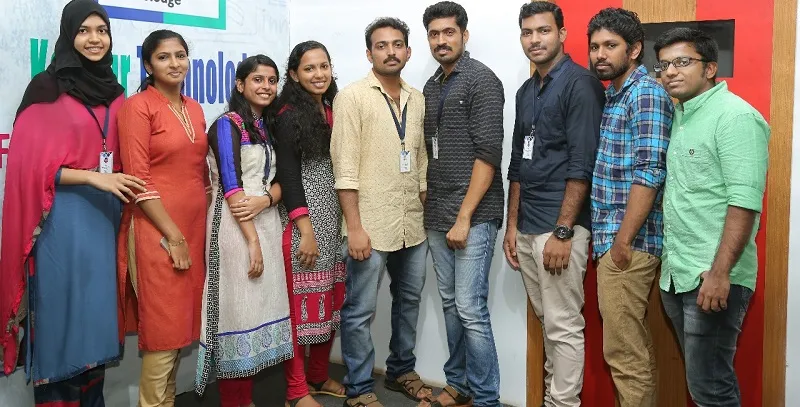Kannur-based startup ArticBot bets big on machine learning
Founded by 26-year-olds V P Rahul and Rijin Ramesh, the platform offers customers virtual chat assistant to address business queries without delays.
Growing up in the historic town of Kannur in Kerala, interactions with tourists were inevitable. While most would answer questions and go their way, V P Rahul and Rijin Ramesh took it as a classroom to hone their ‘customer query management skills’.
The 26-year-olds are co-founders and creators of Articbot, a machine learning platform that helps organisations connect with customers in 100 different languages, and solve queries on products, and processes to procure services.
The idea of building a machine learning platform to address queries was born out of the duo’s personal experiences. “It is a pain to call the customer service centre of an organisation if you are doing business with them,” says Rahul. He adds that a machine or software can do a job several times better than a human being.
“Businesses can automate services with startups like us - machines are precise at answering questions,” he says.
Articbot is a machine learning company that could, going forward, build a large artificial intelligence algorithm which can analyse data from varied sectors and companies. Experts say machine learning is the process whereby one can teach the software to constantly learn from data patterns, and AI is a step forward after machine learning where the software makes decisions based on its learning.

This is much like a child learning newer things each year building on experiences from the past. Globally, corporations like Reflektion and ScoreData are changing the way AI is implemented because of their ability to build complex systems by taking data from large organisations and teach it patterns swiftly.
In India, companies like Flipkart claim they are close to understanding their customers completely. Then there are companies like Grakn.AI that are building databases which can help enterprises prepare for an era of data explosion on which startups can build AI services.
In this scenario, where does Articbot and its virtual assistant fit in? The company competes with several others building chatbots in India. Yellow Messenger, Racetrak.AI and Niki.ai are a few that have received funding, and have also bagged commercial deals in the country.
Articbot has 15 customers at present, eight of whom are paying customers.
The beginning and the business
Rahul and Rijin met at VMKV Engineering College, in Salem, Tamil Nadu where they would spend many an hour talking about data modelling and having software solve complex issues of multi-nodal enterprise data. Graduating in 2012, the two started out at an IT services company in Bengaluru.
Once while creating a payment gateway for a company, they realised the security keys had not been provided by the payment gateway. Calling the payment gateway company’s service team to sort the issue took more than three days. This was in May 2016, and the two quickly realised a business opportunity, and quit their jobs to move to Kannur.
Beginning with coding the platform, Rahul and Rijin employed six engineers and created ArticBot. Rahul went about contacting digital companies, banks and retailers to offer the virtual chat assistant to address business queries.
Say, for an apparel retailer or manufacturer that has several buying agencies checking new collections, in the old format, a salesperson would take calls, send catalogues to buyers, and fix appointments. With a chatbot, however, all these functions can be handled on the website without delay.
The company is targeting a revenue of Rs 10 lakh by the end of this financial year. They have invested Rs 7.5 lakh of their personal funds.
Consulting firm McKinsey sees AI to be a $126 billion industry by 2022. In India, it is yet to gain momentum and see any commercial rollouts. Machine learning is now a big industry in India with a market size of $8 billion worth of exports.
“Startups that have figured out a business model need to scale up and figure out a product market fit across verticals and have long term contracts,” says V Ganpathy, CEO of Axilor Ventures.
Articbot’s costs are low, mainly because it is based in Kannur. Its engineers have built support for 107 languages, and promise to increase closure of queries in minutes. The company creates dashboards for a customer to address important events immediately.
“Over time, our platform can take decisions for client queries,” says Rahul. Articbot works with customers by exporting their customer call data, and training the bot to answer queries based on past patterns.
The company is looking to make an impact in the Robotic Process Automation (RPA) segment. The global RPA market is expected to touch $8.75 billion by 2024 according to Research and Markets. RPA is maturing in terms of clarity, credibility and applicability as organisations are increasingly implementing these solutions.
RPA is emerging as a disrupting technology with the capability to provide benefits such as enhanced accuracy, compliance, cost saving and scalability. As these tools are 65 percent less expensive than full-time employees, industry experts expect RPA to disrupt the conventional Business Process Outsourcing (BPO) model and alter the global outsourcing industry.
According to Research and Markets, the key difference between other automation methods and RPA is the approach used to complete tasks carried out by employees. RPA utilises applications through a standard interface along with the deployment of software without modification to the applications or systems being automated.
Only time will tell if virtual assistants will succeed in India. With some paying customers already, seems Articbot may just pull it off.







